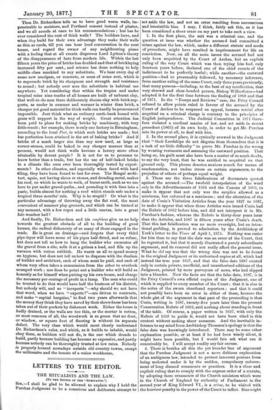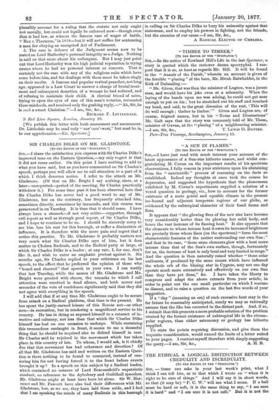LETTERS TO THE EDITOR.
THE RITUALISTS AND THE LAW. [To IMF &mon. OF ass ..spaorma.1 Srn,—I shall be glad to be allowed to explain why I hold the Parches Judgment to be a conscious and deliberate attempt to
set aside the law, and not an error resulting from unconscious and irresistible bias. I may, I think, fairly ask this, as it has been considered a sheer craze on my part to take such a view.
1. In the first place, the suit was a criminal one, and the question at issue was whether the accused had committed a crime against the law, which, under a different statute and mode of procedure, might have resulted in imprisonment for life on conviction. Now, on all the main issues the accused had not only been acquitted by the Court of Arches, but an explicit ruling of the very Court which was then trying him had, only fourteen years before, declared one of the chief counts of the indictment to be perfectly lawful ; while another—the eastward position—bad so presumably followed, by necessary inference, from another ruling of the same Court, only three years previously, that many persons—including, to the best of my recollection, that very shrewd and clear-headed person, Bishop Wilberforce—had adopted it for the first time between the finding of 1868 and that of 1871. In the "Essays and Reviews" case, the Privy Council refused to allow points ruled in favour of the accused by the Court of Arches to be reopened on appeal, because retrial after acquittal on a criminal charge is contrary to the principles of English jurisprudence. The Judicial Committee in 1871 there- fore violated a cardinal maxim of law, and set aside in recent precedent (1863) of its own body, in order to get Mr. Purchas into its power at all, to deal with him.
2. In the second place, it is cynically avowed in the Judgment that " their Lordships do not disguise from themselves that it is a task of no little difficulty" to prove Mr. Parches in the wrong by wearing vestments and assuming the eastward position. That being so, his guilt must also have been a matter of so much doubt, to say the very least, that he was entitled to acquittal on that ground only. This phrase denotes anxious search for means of condemnation, not undue stress on certain arguments, to the prejudice of others of perhaps equal weight.
3. These are the three falsifications of documents quoted against the accused :—The twofold interpolation of the word only in the Advertisements of 1564 and the Canons of 1603, to make it appear that not only was the surplice allowed as a minimum, but enforced as a maximum ; and the alteration of the date of Cosin's Visitation Articles from the year 1627 to 1687, to make it appear that when those Articles were issued Cosin had the Rubric of 1662 before him, and did not interpret it in Mr. Purchas's fashion, whereas the Rubric is thirty-four years later than the Articles, and 1687 is fifteen years after Cosin's death. That this last falsification was no mere oversight, but an inten- tional garbling, is proved to admiration by the Archbishop of York's letter to the Times of April 1, 1875. Nothing was easier for him than to say that the date was an error of the Court, that he regretted it, but that it merely illustrated a purely subordinate argument, and its removal did not really affect the general issue. What he did say was that the wrong date was not to be found in the original Judgment or its authorised copies at all, which had instead the true year 1627, and that the false date 1687 existed only in certain private, unofficial, and unauthorised editions of the Judgment, printed by mere purveyors of news, who had slipped into a blunder. Now the facts are that the false date, 1687, is in the Privy Council's own official copies of the Judgment, one of which is supplied to every member of the Court ; that it is also in the notes of the sworn shorthand reporters ; and that it could not possibly have been an error in either of these, because the whole gist of the argument in that part of the proceeding is that Cosin, writing in 1687, twenty-five years later than the present Consecration Rubric of 1662, said nothing about standing in front of the table. Of course, a paper written in 1627, with only the Rubric of 1559 to guide it, would not have been cited in this context without making sheer nonsense. And the inevitable in- ference to my mind from Archbishop Thomson's apology is that the false date was knowingly introduced. There may be some other explanation possible, or at least if he had been wisely silent, it might have been possible, but I would fain ask what can it conceivably be. I will accept readily any fair excuse.
4. There is besides all this the yet broader line of argument that the Purchas Judgment is not a mere dubious explanation
of an ambiguous law, intended to protect innocent persons from being molested under it by the sadden, compulsory enforce- ment of long disused ornaments or practices. It is a clear and explicit ruling that to comply with the express order of a statute, by adopting those ornaments of the Church ministers which were in the Church of England by authority of Parliament in the second year of King Edward VI., is a crime, to be visited with the heaviest penalty in the power of the Court to inflict. Bias might plausibly account for a ruling that the statute not only ought not morally, but could not legally be enforced now—though even that is bad law, as witness the famous case of wager of battle, " Rex v. Thornton,"in 1818—but it will not suffice for sentencing a man for obeying an unexpired Act of Parliament.
5. The case in defence of the Judgment seems now to be rested on Lord Hatherley's personal integrity as a Judge. Nothing is said on that score about his colleagues. But I may just point ont that Lord Hatherley won his high judicial reputation in trying causes where he had no personal interest or concern. That is certainly not the case with any of the religious suits which have come before him, and his dealings with them must be taken singly on their merits. A famous and popular revival preacher, not long ago, appeared in a Law Court to answer a charge of brutal treat- ment and subsequent desertion of a woman he had seduced, and of refusing to maintain their child. A clerical friend of mine, trying to open the eyes of one of this man's votaries, recounted these misdeeds, and received only the gushing reply,—" Ah, Sir, he is such a sweet Christian !"—I am, Sir, &c.,
RICHARD F. LITTLEDALE.
9 Red Lion Square, London, January 16.
[We publish this letter with both amazement and amusement. Dr. Littledale may be mad only " nor'-nor'-west," but mad he is, to our apprehension.—ED. Spectator.]



































 Previous page
Previous page